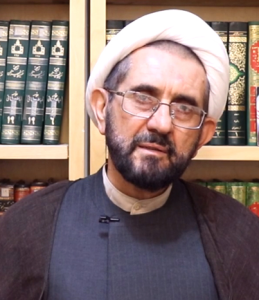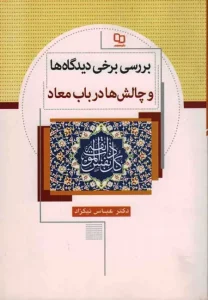BARRESĪ BARKHĪ DĪDGĀH HĀ WA CHĀLESH HĀ DAR BĀB MA’ĀD [AN EXAMINATION OF VARIOUS PERSPECTIVES AND CHALLENGES REGARDING THE AFTERLIFE]. By Abbas Nikzad. Qom, Iran: Daftar Nashr Ma‘āref. 2019. Pp. 168. Paper. 500,000 IRR.
The subject of life after death, encompassing both intermediary and eternal existence, is recognized as one of the principal themes and foundational beliefs within the Holy Qur’an, with approximately one-third of its verses addressing the concept of resurrection. Within this context, numerous works have been produced; however, in this particular study, the author utilizes five articles to articulate uncommon viewpoints that diverge from established beliefs and the consensus of the Muslim community concerning the afterlife and divine punishment.
 This work is structured into five sections, each featuring an article that explores the topic of resurrection from diverse angles. The first section critically investigates significant doubts regarding divine punishment in the afterlife. One argument posits that the rationale behind posthumous punishment serves as a means of deterrence for the offender, a source of reflection for others, or a form of solace for the oppressed. However, such issues do not manifest in the afterlife, which is designated for judgment and reward, rather than for actions. In response to this argument, it is asserted that God has dispatched prophets for the guidance of humanity, promising retribution and reward to His servants; thus, if there were no punishment in the afterlife, the sending of prophets would be rendered pointless and futile. Moreover, should God fail to fulfill His promises, it would imply falsehood, a notion incompatible with the divine attribute of truthfulness. Furthermore, divine reward and punishment in the afterlife are manifestations of divine justice, as some actions transcend the capacity for recompense in this world, necessitating a realm in which the offender can witness the consequences of each and every one of their deeds.
This work is structured into five sections, each featuring an article that explores the topic of resurrection from diverse angles. The first section critically investigates significant doubts regarding divine punishment in the afterlife. One argument posits that the rationale behind posthumous punishment serves as a means of deterrence for the offender, a source of reflection for others, or a form of solace for the oppressed. However, such issues do not manifest in the afterlife, which is designated for judgment and reward, rather than for actions. In response to this argument, it is asserted that God has dispatched prophets for the guidance of humanity, promising retribution and reward to His servants; thus, if there were no punishment in the afterlife, the sending of prophets would be rendered pointless and futile. Moreover, should God fail to fulfill His promises, it would imply falsehood, a notion incompatible with the divine attribute of truthfulness. Furthermore, divine reward and punishment in the afterlife are manifestations of divine justice, as some actions transcend the capacity for recompense in this world, necessitating a realm in which the offender can witness the consequences of each and every one of their deeds.
Another doubt raised concerns the compatibility of divine punishment with the perceived insignificance of some sins. The response highlights that measuring wrongdoing cannot rely solely on its quantity or frequency; rather, the nature and quality of the offense must also be considered. For instance, the gravity of a crime committed in a mere minute, such as an act of mass destruction, may far exceed hundreds of lesser offenses that span days. In a parallel sense, a moment of negligence in this world can yield eternal regret, as illustrated by the tragedy of dozing off while driving. Additionally, the person’s punishment is in this world, which is embodied in the hereafter, and it does not exceed the actions committed by the individual.
The second section critiques and analyzes Ibn Arabi’s perspective on the eternal punishment of disbelievers and polytheists in Hell. He holds that four groups will remain eternally bound to Hell—those who are arrogant towards God (like Pharaoh), polytheists, deniers of God, and hypocrites. However, he contends that although these individuals will not exit Hell, they will ultimately become desensitized to its torment through habitual exposure, leading to the alleviation of their suffering. According to Ibn Arabi, the cessation of punishment implies a lack of sensation of pain rather than an end to the punishment itself. His arguments draw upon divine mercy triumphing over wrath, the ultimate happiness and fulfillment of every being, the inherent servitude and innate monotheism shared by humanity, the transient and mutable nature of punishment, and the universal promise of divine forgiveness contrasted against punishment, supported by select verses and traditions. In response to these claims, it is contended that Ibn Arabi’s views conflict with explicit Qur’anic and hadith references, which affirm the eternal nature of the punishment for disbelievers and polytheists. The assertion that God’s mercy precedes His wrath does not suggest that this mercy applies to all individuals, but rather emphasizes its preeminence in the grand scheme. The innate nature of monotheism for humanity necessitates the exit of the damned from the fires of hell and their entrance into paradise, rather than any alternative outcome. Figures such as Ibn Arabi cannot invoke this rationale to support their perspective.
 The third section fosters a critique of Ibn Qayyim al-Jawziyyah’s position regarding the permanence of punishment in Hell. He believes that while disbelievers and polytheists will remain in Hell eternally, the nature of Hellfire itself is not everlasting and will ultimately extinguish, thereby releasing the inhabitants from their torment. He claims there is no scriptural or consensus basis for the eternal duration of Hellfire. To support his viewpoint, he cites verses from the Qur’an, such as, “The Fire is your abode, wherein you will abide eternally, except as God wills…” (6:128). Ibn Qayyim argues that if their eternal punishment in Hell were certain, such an exception would be unsubstantiated. However, this reasoning is contested, as numerous verses explicitly affirm the everlasting nature of Hellfire, as underscored by the verse, “And they will be in eternal punishment” (5:80). Among his rational arguments is the precedence of divine mercy over wrath, which was addressed in the previous section.
The third section fosters a critique of Ibn Qayyim al-Jawziyyah’s position regarding the permanence of punishment in Hell. He believes that while disbelievers and polytheists will remain in Hell eternally, the nature of Hellfire itself is not everlasting and will ultimately extinguish, thereby releasing the inhabitants from their torment. He claims there is no scriptural or consensus basis for the eternal duration of Hellfire. To support his viewpoint, he cites verses from the Qur’an, such as, “The Fire is your abode, wherein you will abide eternally, except as God wills…” (6:128). Ibn Qayyim argues that if their eternal punishment in Hell were certain, such an exception would be unsubstantiated. However, this reasoning is contested, as numerous verses explicitly affirm the everlasting nature of Hellfire, as underscored by the verse, “And they will be in eternal punishment” (5:80). Among his rational arguments is the precedence of divine mercy over wrath, which was addressed in the previous section.
The fourth section provides an analysis of Mulla Sadra’s views concerning eternal punishment in Hell. Like Ibn Arabi, he supports a temporary understanding of torment, seeking to interpret and contextualize the verses that affirm the eternality of divine punishment. The objections to this theory echo those noted in the earlier sections.
In the concluding section, the potentiality of physical resurrection is explored. Ibn Sina, in some of his works, denies the notion of bodily resurrection, considering it solely as spiritual, while in other texts he argues that corporeal resurrection can only be established through scriptural evidence. The theologians have proposed justifications and solutions to substantiate corporeal resurrection; however, Mulla Sadra asserts that such justifications inherently necessitate acceptance of the concept of reincarnation, which is deemed untenable. Nevertheless, through reliance on philosophical principles, Mulla Sadra advocates for corporeal resurrection, positing that the human resurrected in the afterlife is both the same in spirit and body as the individual in this world, a concept corroborated by religious texts.
In the first section, a specific doubt regarding the philosophy of posthumous punishment was presented; however, the response to this type of challenge did not address the philosophical aspects of afterlife penalties, leaving this query effectively unanswered.
Gholam Reza Mahmoudi
Tolou International Institute, Qom, Iran
